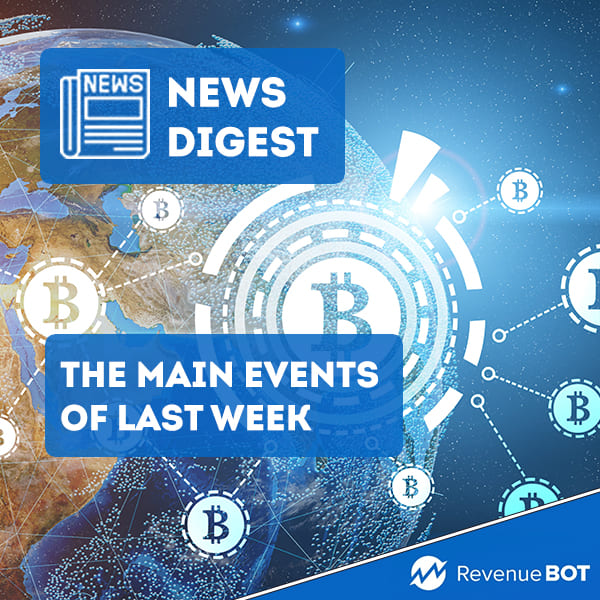
Friday, 24th of February. As the week comes to an end, we can focus on the highlights of the crypto industry over the past few days.
Number of BTC whale addresses dipped to August 2019 values
The total amount of addresses with a balance of 1,000 BTC or more (over $24.7 million) hit mid-2019 marks.
According to Glassnode, the number stands at 2,024 (as of January 20, 2023), compared to 2023 on August 05, 2019.
Individuals in this category peaked in February 2021 near the 2,500 mark. It then went down, contrary to the rally of digital gold to an all-time high around the $69,000 mark.
Nevertheless, the amount of such addresses steadily stays close to the peaks corresponding to the figures of November 2022 and October 2018. As of February 20, 2023, there are a total of 115 wallets with such an enormous quantity.
More and more smaller addresses – with 1 BTC or more – keep increasing, while also updating ATH.
Over the year, the figure increased by 20%, approaching the 982,000 mark.
As of this writing, the first-ever cryptocurrency is trading around the $24,700 level. Moreover, since the beginning of this year, digital gold has surged by almost 50%.
Sepolia testnet’s Shapella upgrade date confirmed by Ethereum Devs
An update to Shanghai-Capella (Shapella) is scheduled to be deployed by the Ethereum team on the Sepolia test network on February 28.
“This update will follow The Merge and allow validators to take their funds out of the Beacon Chain steaming back to the execution level,” the team recalled.
The Shapella hardfork features changes for consensus (Capella) and execution (Shanghai) levels, as well as for the Engine API.
Back in November 2022, the developers launched devnet to pilot the upgrade.
Afterwards, in January 2023, they successfully implemented a shadow fork to test the impact of the intended update on the mainnet. As of now, the team created the Zhejiang Public Network to test the withdrawal of assets from the Beacon Chain.
Prior to the upgrade, node operators and validators in Sepolia would have to update clients to the latest published version, so as not to remain out of date, the developers reminded.
Followed by Sepolia, the hardfork will be tested on the Goerli network, and then implemented in the mainnet. This will presumably happen in March.
As far as you remember, only 31% of Ethereum stakers are in profit concerning the current market quotes, according to Binance Research analysts.
Twitter will open access to the source code of its algorithm
Elon Musk, the head of Twitter, announced the possible opening of the source code of the social network algorithms “as soon as next week”.
“Our algorithm will be open sourced next week, first be prepared to be disappointed,” Musk replied to the suggestion about making the source code publicly available.
The billionaire added that “it will improve quickly.“
Whether the people in charge of the social network are serious or not is unknown. Previously, Musk has repeatedly spoken about the need to make the source code of the algorithms for the formation of tweets accessible to the public.
What’s more, this was also one of Musk’s main promises when he first announced his desire to acquire the social network.
Revealing the source code could also reduce pressure from lawmakers and regulators on Twitter. U.S. Supreme Court is currently considering arguments about the role of YouTube’s algorithm in recommending ISIS videos to users. The final decision could affect the entire crypto industry, according to industry representatives.
In addition, the disclosure of the source code can shift the focus from the uproar over the active promotion of Musk’s tweets even to users who are not subscribed to him.
As reported by some media outlets, the head of the company asked engineers to find out why his own Twitter activity had drastically decreased. It was the developers who changed the algorithm, which increased the number of his tweets.
Musk called such a behavior of the model as a mistake and said that it has been fixed.
Indian Web3 gaming startup Kratos raised $20M estimated at $150 million
Kratos Studios, an India-based gaming-oriented company, has raised $20 million in seed funding, The Block reports.
Accel led the round of the trading session. Among the other participants are Prosus Ventures, Courtside Ventures, Nexus Venture Partners and Nazara Technologies. Investors gave the startup a valuation of $150 million.
Project officials also announced the acquisition of IndiGG, a sub-DAO of Yield Guild Games DAO. This deal was accomplished by exchanging INDI tokens for Kratos.
“The launch of the new coin will take place in 12 months,” stressed project co-founder Manish Agarwal.
In January 2022, IndiGG attracted $6 million from Sequoia Capital India, Lightspeed Venture Partners, Variant Fund, Jump Capital, Animoca Brands and venture capitalist Alan Howard.
As for Kratos, it was founded in September 2022. The startup will develop that brand as part of its acquisition of IndiGG as a gaming DAO, Agarwal also noted.
“We build onchain profiles of gamers in the context of groups and allow game developers to create quests. Developers pay us to post their quests, and players pay us to check them out,” said Ishank Gupta, another co-founder of the project.
As he said, Kratos assists participants in withdrawing onchain assets into fiat money.
Agarwal and Gupta said they would work closely with Polygon co-founder Sandeep Nailwal and Gabby Dizon of Yield Guild Games to create “the world’s largest gaming DAO.”
Formerly a gaming-focused Web3 infrastructure startup, Nefta raised $5 million at a valuation of $32.5 million.
